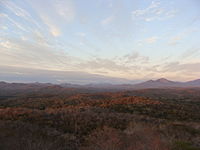
Photo from wikipedia
Abstract Eighty-four Nellore bulls (269 ± 27 kg; 13 months) were used in a completely randomized design to evaluate different supplementation strategies on the performance of growing Nellore cattle grazing Panicum maximum cv.… Click to show full abstract
Abstract Eighty-four Nellore bulls (269 ± 27 kg; 13 months) were used in a completely randomized design to evaluate different supplementation strategies on the performance of growing Nellore cattle grazing Panicum maximum cv. Tanzania in the rainy season and rainy-to-dry season transition. In the rainy season, 42 animals received mineral salt (MS) ad libitum and 42 received protein supplement (PR) at 1 g kg−1 body weight (BW). In the rainy-to-dry season transition, 28 animals received MS, 28 received PR at 1 g kg−1 BW, and 28 received a protein-energy (PE) supplement at 3 g kg−1 BW. In the rainy season, the PR supplement increased average daily gain (ADG), providing a significant increase of 17 kg in final BW. In the first period of the rainy-to-dry season transition, PE promoted better performance than MS, while PR did not differ from the two other treatments. In the second period of the rainy-to-dry season transition, PE and PR increased ADG by 41% and 31%, respectively, compared with MS. In the third period, all supplements differed from each other. Bulls fed PE had greater final BW compared with animals fed PR and MS. In conclusion, during the rainy season, PR supplementation should be provided even under good pasture conditions. Also, during the rainy-to-dry season transition, protein-energy supplementation is recommended to compensate for quantitative and qualitative deficiencies of the pasture. Highlights Nellore cattle being backgrounded on pasture with supplementation has greater body weight in the feedlot entry. Supplementation is recommended to compensate for quantitative and qualitative deficiencies of the pasture. Supplementation promotes a positive response in animal performance.
Journal Title: Italian Journal of Animal Science
Year Published: 2019
Link to full text (if available)
Share on Social Media: Sign Up to like & get
recommendations!